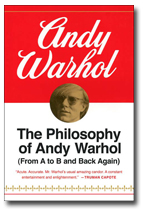Books |
Andy Warhol
By
Published: Jan 01, 2006
Category:
Memoir
I would bet that most Americans think that Andy Warhol was some kind of idiot — at best, an idiot savant. His art was of the dullest American icons: Liz, Liza, Jackie, the dollar bill. He wore a platinum wig that didn’t fit right. He never had anything to say. Sexually, he came across as a neuter: a once-gay guy so locked up inside that he couldn’t connect. All of which might qualify him as a major artist — that is, in an empty culture with nothing more on its mind than celebrities and money.
Would you be astonished to know that — privately, anyway — Andy Warhol was really smart? That he had a coherent way of looking at the world? That he was a sharp judge of character? And that he was a crisp, lucid writer — even though all he did to “write” was to talk on the phone to a friend with a tape-recorder?
Andy called this friend, Pat Hackett, every morning. For a very Andy reason: He wanted a record of his comings and goings the previous day, just in case the IRS questioned his expenses. Because, to Andy, everything he did was Business.
At the start of “The Philosophy of Andy Warhol,” it sounds as if he’s something else — the king of nihilism. “I wake up every morning,” he says. “I open my eyes and think: Here we go again.” Life seems like a matter of killing time. Especially for him: “People are always calling me a mirror and if a mirror looks into a mirror, what is there to see?”
But the conversational back-and-forth is not the only trick Warhol has. Although you don’t expect it, he starts to tell a narrative story — one he’s never fully told elsewhere. It’s the story of his childhood, his childhood diseases, his retreat into art, his hopes for friendship in New York (“I kept living with roommates thinking we could become good friends and share problems but I’d always find out they were just interested in another person sharing the rent.”) So he makes a new friend: his TV. And then he meets his best friend: a tape recorder.
The idea that we are fundamentally alone is hardly new. But few have the courage to hold it up as a philosophy. Or to follow to this extreme: “Sex is nostalgia for sex.” (Grim? Only for a minute. Warhol is nothing if not funny: “I always run into strong women who are looking for weak men to dominate them.” And “I never fall apart because I never fall together.” At one point, B asks, “Is it raining?” Andy’s response: “I think they’re spitting at us.”)
“The Andy Warhol Diaries” — a brick of a book — is like the “Philosophy,” only cattier. “I tried to be diplomatic,” he says, of a dinner party, “but everything just came out like the truth.” It couldn’t be more complete: “Did 40 pushups.” And more-on-the-money: “Joe Kennedy came by with Michael Kennedy, and I don’t know how they can be running for things.” There are few last names, and if you weren’t in New York in the Studio 54 years, you may have trouble with the nightly soap opera.
No matter. Andy is a great narrator. His take on people is all his own, and, often, a decade ahead of popular opinion. In a time when everyone sort of sounds like everyone else, Andy’s like a strong mint — astringent, energizing, challenging. If you feel like thinking, you can start to make connections between his art and the way he looked at the world. Or you could just wallow in the dish — like reading an issue of Vanity Fair in a parallel universe, where one guy tells all the stories and they’re all delightfully twisted.
Beach reading? Oh yes. And bath reading. And, in bed, late at night, a few more entries. You may or may not get the intelligence and wit. But one thing’s sure: You’ll be glad you’re not in it.
To buy “The Philosophy of Andy Warhol” from Amazon.com, click here.
To buy “The Andy Warhol Diaries” from Amazon.com, click here.


